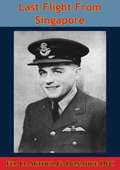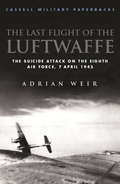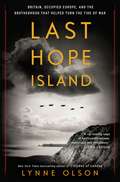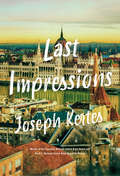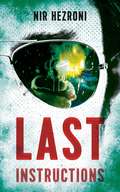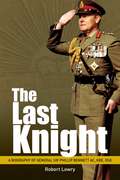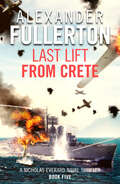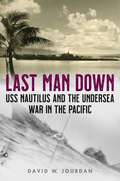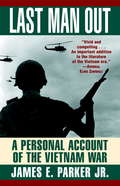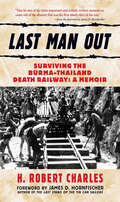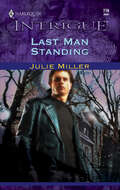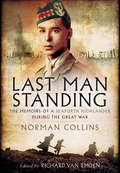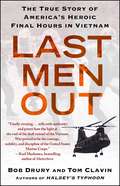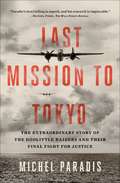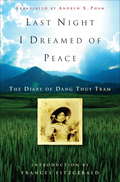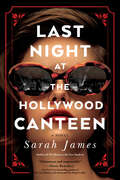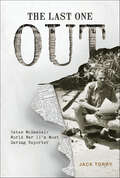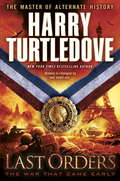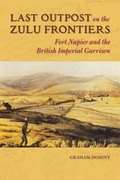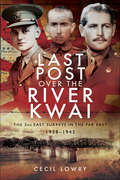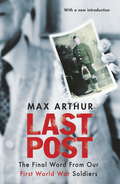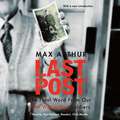- Table View
- List View
Last Flight From Singapore [Illustrated Edition]
by Flt. Lt. Arthur G. Donahue DFCIncludes 20 illustrations.Arthur "Art" Gerald Donahue, a native of Minnesota, bravely entered the fray of the Second World War as volunteer pilot in the Royal Air Force by falsely claiming to be a Canadian in 1940. He was already an experienced pilot before he took off in his Spitfire in 64 Squadron based at RAF Kenley, and then 71 Squadron. His experiences and victories during the Battle of Britain are recounted in his first book "Yankee In A Spitfire" but suffice it to say he flew with great skill and courage as one of the "Few". After a period of brief leave in America he was transferred to the Far East with 258 Squadron, a part of the belated effort to reinforce Singapore. In this book he recounts his adventures in the air over Singapore and Sumatra in the chaotic fighting that saw the British troops routed by a brilliant offensive by the Japanese. Surviving the overwhelming odds in the air, the author managed to escape back to England via India; but was listed as missing in action in 1942."Donahue makes no attempt either to dramatize or underplay his experiences. He tells them in a simple, unvarnished manner, much as if he were sitting down with some friends back home. The result is pretty close to what the real thing must have been."--New York Times
Last Flight of the Luftwaffe
by Adrian WeirThe account of one of the most extraordinary stories to come from the closing days of the Second World War.Desperate times drive determined men to desperate measures. In April 1945, their cause already clearly lost, an ill-assorted, ill-equipped group of Luftwaffe crew decided on one final 'death or glory' kamikaze mission - their trage an incoming USAAF Eighth Air Force bomber formation, their only weapons their aircraft.Adrian Weir has researched this remarkable flight to retell it minute by minute: a hopeless gesture of immense courage, thrilling as the reader flies in the cockpit with the German pilots towards the unstoppable aircarft of the Mighty Eighth. Including accounts from the survivors of the mission, this is one of the most extraordinary stories to come from the closing days of the Second World War.
Last Flight of the Luftwaffe: The Suicide Attack On The Eigth Air Force, 7 April 1945 (Sven Hassel War Classics)
by Adrian WeirThe account of one of the most extraordinary stories to come from the closing days of the Second World War.Desperate times drive determined men to desperate measures. In April 1945, their cause already clearly lost, an ill-assorted, ill-equipped group of Luftwaffe crew decided on one final 'death or glory' kamikaze mission - their trage an incoming USAAF Eighth Air Force bomber formation, their only weapons their aircraft.Adrian Weir has researched this remarkable flight to retell it minute by minute: a hopeless gesture of immense courage, thrilling as the reader flies in the cockpit with the German pilots towards the unstoppable aircarft of the Mighty Eighth. Including accounts from the survivors of the mission, this is one of the most extraordinary stories to come from the closing days of the Second World War.
Last Groom Standing (The Wedding Season #4)
by Kimberly LangMarnie Price's guide to surviving the bridesmaid blues...1. Get a new man2. Find a new job 3. When in doubt, drink wine! Having watched her three closest friends all find love, Southern belle Marnie Price feels as if she's the only single girl left. Luckily she's found a solution-one sizzling night with Dylan Brookes. This man wears a wedding tux better than anyone, but all Marnie wants to do is get beneath it! Dylan is all about making the sensible choice, and a fling with his ex's friend Marnie is about as far from sensible as he can get! Marnie might prove to him that taking risks is worth it, but that doesn't mean he's ready to give up his bachelor status quite yet, does it...?Look for all four books in the Wedding Season series from Harlequin KISS: The Unexpected Wedding Guest by Aimee Carson, Girl Least Likely to Marry by Amy Andrews, Maid of Dishonor by Heidi Rice and Last Groom Standing by Kimberly Lang.
Last Hope Island: Britain, Occupied Europe, and the Brotherhood That Helped Turn the Tide of War
by Lynne OlsonA groundbreaking account of how Britain became the base of operations for the exiled leaders of Europe in their desperate struggle to reclaim their continent from Hitler, from the New York Times bestselling author of Citizens of London and Those Angry Days When the Nazi blitzkrieg rolled over continental Europe in the early days of World War II, the city of London became a refuge for the governments and armed forces of six occupied nations who escaped there to continue the fight. So, too, did General Charles de Gaulle, the self-appointed representative of free France. As the only European democracy still holding out against Hitler, Britain became known to occupied countries as “Last Hope Island.” Getting there, one young emigré declared, was “like getting to heaven.” In this epic, character-driven narrative, acclaimed historian Lynne Olson takes us back to those perilous days when the British and their European guests joined forces to combat the mightiest military force in history. Here we meet the courageous King Haakon of Norway, whose distinctive “H7” monogram became a symbol of his country’s resistance to Nazi rule, and his fiery Dutch counterpart, Queen Wilhelmina, whose antifascist radio broadcasts rallied the spirits of her defeated people. Here, too, is the Earl of Suffolk, a swashbuckling British aristocrat whose rescue of two nuclear physicists from France helped make the Manhattan Project possible. Last Hope Island also recounts some of the Europeans’ heretofore unsung exploits that helped tilt the balance against the Axis: the crucial efforts of Polish pilots during the Battle of Britain; the vital role played by French and Polish code breakers in cracking the Germans’ reputedly indecipherable Enigma code; and the flood of top-secret intelligence about German operations—gathered by spies throughout occupied Europe—that helped ensure the success of the 1944 Allied invasion. A fascinating companion to Citizens of London, Olson’s bestselling chronicle of the Anglo-American alliance, Last Hope Island recalls with vivid humanity that brief moment in time when the peoples of Europe stood together in their effort to roll back the tide of conquest and restore order to a broken continent.Advance praise for Last Hope Island“A rip-roaring saga of hairbreadth escape, espionage, and resistance during World War II, Lynne Olson’s Last Hope Island salvages the forgotten stories of a collection of heroic souls from seven countries overrun by Hitler who find refuge in Churchill’s London and then seek payback in ways large and small. In thrilling fashion, Olson shows us that hell hath no fury like a small country scorned.”—Erik Larson, New York Times bestselling author of Dead Wake “Lynne Olson is a master storyteller, and she brings her great gifts to this riveting narrative of the resistance to Hitler’s war machine. You will be thrilled and moved—and enraged, saddened, and shocked—by the courage and steadfastness, human waste and stupidity, carelessness and nobility, of an epic struggle. Last Hope Island is a smashing good tale.”—Evan Thomas, New York Times bestselling author of Being Nixon “A powerful and surprising account of how figures from Nazi-occupied Europe found Great Britain an essential shield and sword in the struggle against Hitler. This is a wonderful work of history, told in Olson’s trademark style.”—Jon Meacham, Pulitzer Prize–winning author of American Lion
Last Impressions
by Joseph KertesHow can you say goodbye forever when you've left an important secret unspoken?"I'll tell you what I'm going to do," Zoltan said. "When I die, I'll leave my luck to you."Zoltan Beck is dying. His devoted but long-suffering sons, Ben and Frank, are trying to prepare themselves and their families for Zoltan's eventual departure...but they can't quite bring themselves to believe that the end is really at hand, and neither can Zoltan himself. The head of a family marked by war and tragedy for decades, he "can't stand to be in a room with a miserable person" and has done his best to keep the pain of his refugee past from his beloved children. But as he faces the end of his life, he discovers a heartbreaking secret from the War that will ultimately bring the family together--or irrevocably disrupt it. Set in both mid-20th century Hungary and contemporary Toronto, this is a deeply moving novel that revels in the energy of its extraordinary characters. It is the story of lost love and newfound connections, of a father and his sons desperately reaching out to bridge an ever-widening gap...even as their time together ebbs away.
Last Instructions (Agent 10483 Ser. #2)
by Nir HezroniFirst there was Three Envelopes, critically acclaimed on publication – now the story of Israeli secret service operative Agent 10483 continues in Last Instructions. A psychopathic former Israeli spy, Agent 10483 is busy trying to shut down the spy organization he once worked for. At the same time, he is plotting his revenge on the individuals he deemed responsible for betraying him, and trying to hunt down a nuclear warhead. It cannot end well. Everyone wants to get their hands on him: the Organization, two assassins working for Herr Schmidt, who is also trying to get hold of the warhead, and Carmit, who has quite literally been messing with his brain. Offering a fascinating behind-the-scenes glimpse into the technology of high-level intelligence operations, Nir Hezroni&’s dark thriller is a chilling exploration of a psychotic killer.
Last Knight: A Biography of General Sir Phillip Bennett AC, KBE, DSO (Big Sky Publishing Ser.)
by Robert LowryGeneral Sir Phillip Bennett is a good example of what makes a great leader. With a good combination of innate personal qualities, education, broad experience and the hardening that comes with survival on the battlefield he prospered. As a young officer he survived the first and most perilous year of the Korean War, including the Battle of Kapyong.
Last Lift from Crete (Nicholas Everard Naval Thrillers)
by Alexander FullertonCrete, May 1941. Against all odds the Everards must survive a relentless Luftwaffe assault.The situation is dire for British forces in the Mediterranean. Their ships, with no air cover, have to run the gauntlet of 2,000 German bombers; and can only lick their wounds under cover of darkness.Nick Everard commands the destroyer Tuareg as it ventures well inside Stuka territory. There they are ordered to evacuate a body of troops, plus an Australian field hospital and thirty nurses, from right under the Germans’ noses.The soon-decimated flotilla has to make it round the Aegean, then out of Crete – but only a miracle can save them!Last Lift from Cretecombines gripping personal drama with incredible naval action, and is a must-read for fans of Alistair MacLean and C. S. Forester.Praise for Alexander Fullerton‘Impeccable in detail and gripping in impact’ Irish Independent‘His action passages are superb and he never puts a period foot wrong’ Observer‘The research is unimpeachable and the scent of battle quite overwhelming’ Sunday Times
Last Man Down: USS Nautilus and the Undersea War in the Pacific
by David W. JourdanSS-168—the USS Nautilus—was the flagship of Submarine Division 12 operating out of Pearl Harbor throughout World War II. It was commissioned July 1, 1930, before international naval treaties limited future submarine size, and thus was among the largest submarines in the U.S. fleet. Over a football field in length and displacing 4,000 tons submerged, the boat was able to carry a large crew, ample cargo, two dozen torpedoes, cruiser-sized six-inch caliber guns, and cruise as far as 25,000 miles. She could dive to three hundred feet—though her crew was known to take her deeper. Throughout 1942–45 the Nautilus engaged the enemy in fourteen different patrols, from the Battle of Midway to the liberation of the Philippines, earning fourteen battle stars. Her skipper, William H. Brockman, Jr., received not one but three Navy Crosses for heroism, the first for fighting through 42 depth charges at Midway. Nautilus did everything a submarine can do and was involved in most of the major actions of the Pacific theater. In Last Man Down, historical events documented in deck logs and patrol reports are told through the voices of the men who lived them.
Last Man Out: A Personal Account of the Vietnam War
by James E. Parker Jr."I WAS AMONG THE FIRST MEN IN, AND I WAS THE LAST MAN OUT. " In Vietnam, at both the start and finish of the conflict, 2d Lt. James E. Parker Jr. saw the war as few men did. Now, with uncommon insight and raw honesty, he captures the stark realities of jungle combat, heavy casualties, and heroic sacrifice. From the tight confines of a VC-occupied Cu Chi tunnel to bloody firefights in areas that hardcore VC and NVA vets had controlled for decades, Parker relives the rain, the heat, the horror, the pain--and the anguish of kneeling beside a buddy whose blood turnd the soil black as he lays dying. Vietnam exacted a very high price. Parker pays tribute to the men who paid it.
Last Man Out: Surviving the Burma-Thailand Death Railway: A Memoir
by H. Robert CharlesAn American Marine recounts his ordeal as a World War II POW forced by the Japanese to build the railway immortalized in The Bridge on the River Kwai.From June 1942 to October 1943, more than 100,000 Allied POWs who had been forced into slave labor by the Japanese died building the infamous Burma-Thailand Death Railway, an undertaking immortalized in the film The Bridge on the River Kwai. One of the few who survived was American Marine H. Robert Charles, who describes the ordeal in vivid and harrowing detail in Last Man Out. The story mixes the unimaginable brutality of the camps with the inspiring courage of the men, such as a Dutch Colonial Army doctor whose skill and knowledge of the medicinal value of wild jungle herbs saved the lives of hundreds of his fellow POWs, including the author.Praise for Last Man Out“A remarkable story, long overdue, of the treatment of POW’s captured by Japan.” —Arthur L. Maher, USN, Senior officer to survive sinking of the USS Houston, POW of the Japanese in World War II“In World War II, to move materials and troops from Japan to Burma by avoiding the perilous sea route around the Malay Peninsula, the Japanese military built a railroad through the jungles of Thailand and Burma at great human cost to its prisoner laborers. Last Man Out is an effective addition to the history of this tragedy.” —Library Journal
Last Man Standing (The Taylor Clan #6)
by Julie MillerUndercover cop Cole Taylor had his hands full sustaining a secret identity as he worked to expose a Kansas City crime boss--while living under the enemy's roof! The last thing he needed was a snooty intellectual type interfering in his investigation, asking suspicious questions and snooping where she shouldn't. Besides, with all that fiery red hair and miles of silky skin, Victoria Westin didn't look like any professor he knew....She had the touch-me-not beauty of an aristocrat and fit right in with their upper-crust hosts. But the streetwise Taylor from working-class roots would have to persuade Miss High-and-Mighty to cooperate with his plan to save his life--and now hers, too. And if he couldn't gain her cooperation by his usual methods, he'd blackmail her with bedroom fantasies to "maintain cover."
Last Man Standing: The Memiors of a Seaforth Highlander During the Great War
by Norman CollinsA first-hand account of World War I by a nineteen-year-old Englishman who led a platoon into the carnage of the Battle of the Somme. While researching his excellent earlier book: Veterans of World War I, author Richard Van Emden encountered a fascinating personality of that long-ago conflict. After witnessing German naval attacks on British civilians, Norman Collins enlisted in the Seaforth Highlanders of the 51st Highland Division, even though he was under age. Collins fought at the battles of Beaumont Hamel, Arras, and Passchendaele, and was wounded several times. Collins lived to be 100 and had an unusually detailed collection of letters, documents, illustrations and photographs. Richard Van Emden has written a moving biography of a unique personality at war, and his long life after the dramatic events of his youth.&“This is a harrowing tale of battle, loss and the horrors of war.&” —Scotland Magazine&“His collection of letters, photographs and the record of interviews as an old man are a treasure trove of information on Western Front fighting.&” —British Army Review/Soldier Magazine&“Enthralling memoir. These letters form the freshest part of this book, full of detail about kit and food that obsessed soldiers but which do not find a place in the history books.&” —Who Do You Think You Are?&“This is one of the last great first-person memoirs of the Great War. Extraordinary diary, letter collection and photos.&” —Scottish Legion News
Last Men Out: The True Story of America's Heroic Final Hours in Vietnam
by Bob Drury Tom ClavinThe monsoon winds swirling up from the South China Sea had doubled in magnitude as Marine Staff Sergeant Mike Sullivan stood on the roof of the American Embassy, watching North Vietnamese artillery pound Saigon's airport. It was late in the afternoon of April 29, 1975, and for the past eight days the airstrip had been the busiest in the world as flight after flight of United States cargo planes ferried Vietnamese refugees, American civilians, and soldiers of both countries to safety while 150,000 North Vietnamese troops marched on the city. With Saigon now encircled and the airport bombed out, thousands were trapped.Last Men Out tells the remarkable story of the drama that unfolded over the next twenty-four hours: the final, heroic chapter of the Vietnam War as improvised by a small unit of Marines, a vast fleet of helicopter pilots flying nonstop missions beyond regulation, and a Marine general who vowed to arrest any officer who ordered his choppers grounded while his men were still on the ground. It would become the largest-scale evacuation ever carried out--what many would call an American Dunkirk.In a gripping, moment-by-moment narrative based on a wealth of recently declassified documents and indepth interviews, Bob Drury and Tom Clavin focus on the story of the eleven young Marines who were the last men to leave, rescued from the Embassy roof just moments before capture, having voted to make an Alamo-like last stand. As politicians in Washington struggled to put the best face on disaster and the American ambassador refused to acknowledge that the end had come and to evacuate, these courageous men held their ground and helped save thousands of lives. They and their fellow troops on the ground and in the air had no room for error as frenzy broke out in the streets and lashing rains and enemy fire began to pelt the city. One Marine pilot, Captain Gerry Berry, flew for eighteen straight hours and had to physically force the American ambassador onto his helicopter.Drury and Clavin gained unprecedented access to the survivors, to the declassified "After-Action reports" of the operation, and to the transmissions among helicopter pilots, their officers, and officials in Saigon secretly recorded by the National Security Agency. They deliver a taut and stirring account of a turning point in American history which unfolds with the heart-stopping urgency of the best thrillers--a riveting true story finally told, in full, by those who lived it.
Last Men Outt: The True Story of America's Heroic Final Hours in Vietnam
by Bob Drury Tom ClavinThe monsoon winds swirling up from the South China Sea had doubled in magnitude as Marine Staff Sergeant Mike Sullivan stood on the roof of the American Embassy, watching North Vietnamese artillery pound Saigon's airport. It was late in the afternoon of April 29, 1975, and for the past eight days the airstrip had been the busiest in the world as flight after flight of United States cargo planes ferried Vietnamese refugees, American civilians, and soldiers of both countries to safety while 150,000 North Vietnamese troops marched on the city. With Saigon now encircled and the airport bombed out, thousands were trapped.Last Men Out tells the remarkable story of the drama that unfolded over the next twenty-four hours: the final, heroic chapter of the Vietnam War as improvised by a small unit of Marines, a vast fleet of helicopter pilots flying nonstop missions beyond regulation, and a Marine general who vowed to arrest any officer who ordered his choppers grounded while his men were still on the ground. It would become the largest-scale evacuation ever carried out--what many would call an American Dunkirk.In a gripping, moment-by-moment narrative based on a wealth of recently declassified documents and indepth interviews, Bob Drury and Tom Clavin focus on the story of the eleven young Marines who were the last men to leave, rescued from the Embassy roof just moments before capture, having voted to make an Alamo-like last stand. As politicians in Washington struggled to put the best face on disaster and the American ambassador refused to acknowledge that the end had come and to evacuate, these courageous men held their ground and helped save thousands of lives. They and their fellow troops on the ground and in the air had no room for error as frenzy broke out in the streets and lashing rains and enemy fire began to pelt the city. One Marine pilot, Captain Gerry Berry, flew for eighteen straight hours and had to physically force the American ambassador onto his helicopter.Drury and Clavin gained unprecedented access to the survivors, to the declassified "After-Action reports" of the operation, and to the transmissions among helicopter pilots, their officers, and officials in Saigon secretly recorded by the National Security Agency. They deliver a taut and stirring account of a turning point in American history which unfolds with the heart-stopping urgency of the best thrillers--a riveting true story finally told, in full, by those who lived it.
Last Mission to Tokyo: The Extraordinary Story of the Doolittle Raiders and Their Final Fight for Justice
by Michel ParadisA thrilling narrative that introduces a key but underreported moment in World War II: The Doolitte Raids and the international war crimes trial in 1945 that defined Japanese-American relations and changed legal history.In 1942, freshly humiliated from the attack on Pearl Harbor, the United States was in search of a plan. President Roosevelt, determined to show the world that our nation would not be intimidated or defeated by enemy powers, he demanded recommendations for a show of strength. Jimmy Doolittle, a stunt pilot with a doctorate from MIT, came forward, and led eighty young men, gathered together from the far-flung corners of Depression-era America, on a seemingly impossible mission across the Pacific. Sixteen planes in all, they only had enough fuel for a one-way trip. Together, the Raiders, as they were called, did what no one had successfully done for more than a thousand years. They struck the mainland of Japan and permanently turned the tide of the war in the Pacific. Almost immediately, The Doolittle Raid captured the public imagination, and has remained a seminal moment in World War II history, but the heroism and bravery of the mission is only half the story. In Last Mission to Tokyo, Michel Paradis reveals the dramatic aftermath of the mission, which involved two lost crews captured, tried, and tortured at the hands of the Japanese, a dramatic rescue of the survivors in the last weeks of World War II, and an international manhunt and trial led by two dynamic and opposing young lawyers—in which both the United States and Japan accused the other of war crimes—that would change the face of our legal and military history. Perfect for fans of Lucky 666 and Nuremberg: Infamy on Trial, Last Mission to Tokyo is a thrilling war story-meets-courtroom-drama that explores a key moment in World War II.
Last Night I Dreamed of Peace: The Diary of Dang Thuy Tram
by Dang Thuy TramAt the age of twenty-four, Dang Thuy Tram volunteered to serve as a doctor in a National Liberation Front (Viet Cong) battlefield hospital in the Quang Ngai Province. Two years later she was killed by American forces not far from where she worked. Written between 1968 and 1970, her diary speaks poignantly of her devotion to family and friends, the horrors of war, her yearning for her high school sweetheart, and her struggle to prove her loyalty to her country. At times raw, at times lyrical and youthfully sentimental, her voice transcends cultures to speak of her dignity and compassion and of her challenges in the face of the war’s ceaseless fury.The American officer who discovered the diary soon after Dr. Tram’s death was under standing orders to destroy all documents without military value. As he was about to toss it into the flames, his Vietnamese translator said to him, “Don’t burn this one. . . . It has fire in it already.” Against regulations, the officer preserved the diary and kept it for thirty-five years. In the spring of 2005, a copy made its way to Dr. Tram’s elderly mother in Hanoi. The diary was soon published in Vietnam, causing a national sensation. Never before had there been such a vivid and personal account of the long ordeal that had consumed the nation’s previous generations.Translated by Andrew X. Pham and with an introduction by Pulitzer Prize winner Frances FitzGerald, Last Night I Dreamed of Peace is an extraordinary document that narrates one woman’s personal and political struggles. Above all, it is a story of hope in the most dire of circumstances—told from the perspective of our historic enemy but universal in its power to celebrate and mourn the fragility of human life.
Last Night at the Hollywood Canteen: A Novel
by Sarah James"Glamorous and suspenseful." —Marie Benedict, New York Times bestselling authorPerhaps the best place in 1943 Hollywood to see the stars is the Hollywood Canteen, a club for servicemen staffed exclusively by those in show business. Murder mystery playwright Annie Laurence, new in town after a devastating breakup, definitely hopes to rub elbows with the right stars. Maybe then she can get her movie made.But Hollywood proves to be more than tinsel and glamour. When despised film critic Fiona Farris is found dead in the Canteen kitchen, Annie realizes any one of the Canteen's luminous volunteers could be guilty of the crime. To catch the killer, Annie falls in with Fiona's friends, a bitter and cynical group—each as uniquely unhappy in their life and career as Annie is in hers—that call themselves the Ambassador's Club.Solving a murder in real life, it turns out, is a lot harder than writing one for the stage. And by involving herself in the secrets and lies of the Ambassador's Club, Annie just might have put a target on her own back. "This vibrant, utterly delightful mystery expertly captures the drama, glamour and absurdity of wartime Hollywood. Sarah James's swift dialogue, dry wit and clever characters transport you into a 1940s movie, where the jokes are quick, the love affairs scandalous and the cast as charming as they are flawed." —Brianna Labuskes, author of The Librarian of Burned Books
Last One Out: Yates McDaniel: World War II's Most Daring Reporter
by Jack TorryThis is an exciting story about a newspaper reporter who risked his life on countless occasions in Nanking, Singapore, and Manila to provide people throughout the world with riveting coverage of the war in Asia.Author Jack Torry spent two and a half years reading hundreds of the subject's newspaper articles, examining scores of letters written by McDaniel's parents and sister, going through personal letters he wrote during the war, and reviewing extensive interview notes in the Library of Congress.McDaniel was the last reporter to leave Singapore before its fall to the Japanese in 1942. He escaped on one of the last ships leaving Singapore, and when it was sunk by Japanese aircraft, he and 130 others had to survive on a deserted island.
Last Orders
by Harry TurtledoveHistory is changed by one small act.In an extraordinary saga of nations locked in war, master storyteller Harry Turtledove tells the story of World War II, which begins over Czechoslovakia rather than Poland, eleven months earlier than it really came. Now we have the final installment in Turtledove's landmark World War II series. Hitler's Plan A was to win in a hurry, striking hard and deep into France. There was no Plan B. Now the war grinds on. Countries have been forced into strange alliances. The Nazis fortify thin lines with Hungarian and Romanian troops. England, finding its footing after the suspicious death of Winston Churchill and a coup d'état, fights back in Europe and on the seas of the North Atlantic. Jews fight on both sides of the war--in secret in German uniform, openly in Spain, France, and Russia. Into the standoff come new killing tools, from tanks to bazookas. In the Pacific, Japan prepares bombs filled with macabre biological concoctions to be dropped on Hawaii. For the U.S., the only enemy is Japan, as there has been no casus belli for America in Europe. Then Hitler becomes desperate and declares war on the United States. But is it too late? His own people are rising up in revolt. The German military may have to put down the violence, even perhaps bomb its own cities. In this epic drama, real men and women are shaped by the carnage, and their individual acts in turn shape history. Drawing on the gritty, personal reality of war and on a cast of unforgettable characters, Harry Turtledove has written an alternate history that intrigues, fascinates, and astounds. Praise for Harry Turtledove "If you like alternate histories, you're going to like this series a lot."--The San Diego Union-Tribune "Turtledove is the standard-bearer for alternate history."--USA Today Coup d'Etat "This is what alternative history is all about."--Historical Novel Society The Big Switch "The Hugo Award winner continues to delight in exploring the world of 'what if?'"--Library Journal West and East "There's plenty to satisfy fans of military strategy, tactics, and armaments."--Publishers WeeklyHitler's War "Turtledove is always good, but this return to World War II . . . is genuinely brilliant. . . . The characterizations in particular bring the book to extraordinary life."--BooklistFrom the Hardcover edition.
Last Outpost on the Zulu Frontier: Fort Napier and the British Imperial Garrison
by Graham DominySmall and isolated in the Colony of Natal, Fort Napier was long treated like a temporary outpost of the expanding British Empire. Yet British troops manned this South African garrison for over seventy years. Tasked with protecting colonists, the fort became even more significant as an influence on, and reference point for, settler society. Graham Dominy's Last Outpost on the Zulu Frontier reveals the unexamined but pivotal role of Fort Napier in the peacetime public dramas of the colony. Its triumphalist colonial-themed pageantry belied colonists's worries about their own vulnerability. As Dominy shows, the cultural, political, and economic methods used by the garrison compensated for this perceived weakness. Settler elites married their daughters to soldiers to create and preserve an English-speaking oligarchy. At the same time, garrison troops formed the backbone of a consumer market that allowed colonists to form banking and property interests that consolidated their control.
Last Post over the River Kwai: The 2nd East Surreys in the Far East, 1938–1945
by Cecil LowryLast Post Over the River Kwai is the carefully researched account of the experiences of the officers and men of 2nd Battalion The East Surreys during the Second World War.Stationed in Shanghai in the early 1940s, the Battalion was deployed to Malaya and fought gallantly to slow the Japanese advance. After heavy losses the survivors found themselves POWs in Singapore in February 1942 after the humiliating surrender which Churchill described as Britains worst ever military disaster.The next three and a half years saw members of the Battalion suffering appalling hardship at the hands of their brutal Japanese captors, whether in Singapore, on the Death Railway, Malaya or Japan itself, as wells as on hellships. Many died but remarkably the majority survived to tell their story. Their prolonged captivity with unbelievable hardship, deprivation and cruelty makes for distressing but inspiring reading.
Last Post: The Final Word From Our First World War Soldiers
by Max ArthurThe 'Forgotten Voices' of the First World War speak for the final time.LAST POST is very consciously the last word from the handful of First World War survivors who were left alive in 2004. Now they have passed away, our final human connection with the First World War has been broken.Max Arthur, a skilled interviewer, took the very last chance we had to ask questions of those who were there. Now updated to include a new introduction by the author for the centenary of the First World War.
Last Post: The Final Word From Our First World War Soldiers
by Max ArthurLAST POST is very consciously the last word from the handful of First World War survivors who were left alive in 2004. Now they have passed away, our final human connection with the First World War has been broken.Max Arthur, a skilled interviewer, took the very last chance we had to ask questions of those who were there. Read by Max Arthur, Paul McGann and Clive Mantle(p) 2007 Orion Publishing Group
